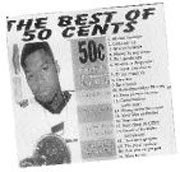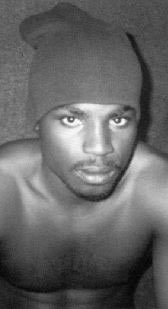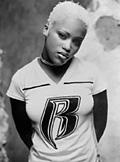Certain things are meant to be bought on the street. It’s clear, for example, that the trade in certain mind-altering substances could never truly be at home anywhere but the corners, back alleys, and main thoroughfares of our nation’s cities. Particular types of food—hot dogs in New York, cr갥s in Paris—are integral parts of the mythos of their respective urban homes. Incense, radical literature, hand-crafted jewelry—such things never carry as much potency as they do when being hawked from a blanket tossed by the side of the road.
But music? Who needs the streets? You’ve got major chains, minor chains, Internet stores, Napster (well, maybe not), Audiogalaxy, Aimster, etc. There’s so much music out there in the comfortable world that it hardly seems necessary to scavenge the streets, the bodegas, and the shady kiosks by the train station. But it’s there that urban music is jiggling, multiplying, and exploding. Moreover, the things that happen on the street have an unimaginable effect on the industry as a whole. Street demand can be sensed on the most tangible level by watching how quickly certain products make it to the black market. Some albums are on New York’s Canal Street weeks before they hit stores, thanks to illicitly obtained master tapes and a thirsty public.
Artists naturally complain that bootlegs compromise their own sales, and more than one hip-hop video has featured a scene of a bootlegger’s table getting tossed over and their product destroyed. When rumors began circulating that record executive Lance “Un” Rivera was responsible for leaking an advance copy of Jay-Z’s Vol. 3: Life & Times of S. Carter to bootleggers, he was stabbed at Q-Tip’s album release party in New York, allegedly by Jigga himself. (He will stand trial on those charges later this year.)
Clearly Jay wasn’t setting a good example for his minions: Prot駩 Beanie Sigel faced similar problems with Cosmic Kev, a Philadelphia DJ who compiled a Best of Beanie Sigel mix tape and circulated it through the bootleg rounds. Kev had thought he was doing so with Beanie’s approval—new artists often encourage these types of compilations to generate and reinforce street buzz—but Beanie demonstrated otherwise by assaulting Kev in a Philly nightclub. (Ever wonder what became of DJ K La Boss, of EPMD and later DJ Four Five with Craig Mack? Well, there he is mixing a 41-track best of Jay-Z collection. Watch your back, man!)
But consequences of bootlegging are rarely so dire. If you were lucky enough to catch early versions of recent albums by Snoop Dogg, Lil’ Kim, and Shyne on the streets, you’d be holding gobs of exclusive material (of dubious audio quality, it should be said) that never made the final cut (not to mention color-copied album covers that look like photos run through a kaleidoscope). Mobb Deep’s last album, Murda Muzik, was so widely bootlegged so long before its intended release that the group went into the studio and released an album that bore little resemblance to the original version, a move that prompted The Source to review the album in three versions—two bootleg and one final. (For the record, the bootleg review idea was cribbed from XXL, which featured an all-bootleg review section in one 2000 issue.)
Extensive bootlegging can also be a catalyst for labels to release unheard material. Take Tupac Shakur, who left reams of unreleased material after his death in 1996 and whose cult of personality created a rabid fan following. In 1997, the streets were flooded with “new” Tupac material released as the Makaveli series (fueling rumors that his murder was a hoax), which, at last count, had at least six volumes to it. The “official” posthumous material pales in volume.
Most often, though, the streets serve as salvation for artists who aren’t getting their due. For some, bootlegging is as good as it gets. 50 Cent was dropped from Columbia before his album ever saw the light of day (certainly his name-calling, anti-industry fusillade “How to Rob” didn’t help matters). But 50 lives on with the amusingly mistitled The Best of 50 Cents, available on a street corner near you and thick with cuts from the lost album and tons of freestyles. Queensbridge icon Cormega also had a deal, with Def Jam, and was released prematurely, making the streets his primary listening station. Best of Cormega tapes are hard to find but essential, and they doubtless paved the way for his recent release on Boston indie imprint Landspeed. Old-school icon Tragedy Khadafi was so frustrated by his label’s mistreatment of his album that he leaked it to bootleggers himself. Demand for the CD was so robust that he was eventually picked up again by his own label to help with proper distribution. And AZ, who’d made a name for himself with a classic appearance on Nas’ “Life’s a Bitch,” was looking for a little resurrection when releasing his bootleg-only collection AZ Save Our Streets. The result? A new record deal and another chance at the show. Jay-Z knows it best: The streets it watchin’.








